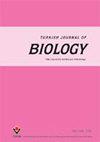抗pd - l1单克隆抗体对血管生成及侵袭相关基因表达的影响
IF 0.9
4区 生物学
Q3 BIOLOGY
引用次数: 0
摘要
背景/目的:PD-L1通过与PD-1受体结合调节免疫抑制肿瘤微环境的作用已被广泛研究。PD-1/PD-L1轴是肿瘤免疫逃逸的重要途径,PD-L1在肿瘤细胞上的表达被认为是抗PD-1/PD-L1单克隆抗体(MoAbs)的预测标志物。然而,PDL1在肿瘤中的内在作用尚不清楚。因此,我们旨在研究抗pd - l1抗体对肿瘤细胞血管生成和转移相关基因表达的影响。材料和方法:以PD-L1低表达(50%)的前列腺癌和黑色素瘤细胞为实验对象。检测3种不同剂量pd - l1抗体作用下肿瘤细胞中VEGFA、E-cadherin、TGFß1、EGFR、bFGF基因及蛋白的表达。结果:我们发现抗PD-L1处理后,VEGFA、E-cadherin和TGFß1在PD-L1高表达细胞中表达升高,在PD-L1低表达细胞中表达降低。EGFR表达水平在PD-L1高的细胞中是可变的,而在PD-L1低的细胞中则有所下降。在PD-L1高表达的前列腺癌细胞系中,抗PD-L1抗体可增加bFGF的表达。结论:PD-L1单克隆抗体与肿瘤细胞的结合可能影响肿瘤的内在机制。抗PD-L1治疗激活血管生成和转移相关通路可能是PD-L1高肿瘤的促瘤机制。在PD-L1低肿瘤细胞中,抗PD-L1治疗后VEGFA、TGFß1和EGFR的降低为在PD-L1低肿瘤中使用这些抗体提供了理论依据。本文章由计算机程序翻译,如有差异,请以英文原文为准。
The effects of anti-PD-L1 monoclonal antibody on the expression of angiogenesis and invasion-related genes
Background/aim: The role of PD-L1 in regulating the immunosuppressive tumor microenvironment via its binding on PD-1 receptors is extensively studied. The PD-1/PD-L1 axis is a significant way of cancer immune escape, and PD-L1 expression on tumor cells is suggested as a predictive marker for anti-PD-1/PD-L1 monoclonal antibodies (MoAbs). However, the tumor-intrinsic role of PDL1 is not known well. Therefore, we aimed to investigate the effects of anti-PD-L1 antibodies on the expression of angiogenesis and metastasis-related genes in tumor cells. Materials and methods: The experiments were done with prostate cancer and melanoma cells with low PD-L1 expression (<5%) and prostate and breast cancer cells with high PD-L1 expression (>50%). The gene and protein expressions of VEGFA, E-cadherin, TGFß1, EGFR, and bFGF in tumor cells were assayed at the 3 different doses of the anti-PD-L1 antibody. Results: We found that VEGFA, E-cadherin and TGFß1 expressions increased in PD-L1 high cells but decreased in PD-L1 low cells after anti-PD-L1 treatment. EGFR expression levels were variable in PD-L1 high cells, while decreased in PD-L1 low cells upon treatment. Also, the anti-PD-L1 antibody was found to increase bFGF expression in the prostate cancer cell line with high PD-L1 expression. Conclusion: Our results suggest that the binding of PD-L1 on tumor cells by an anti-PD-L1 monoclonal antibody may affect tumorintrinsic mechanisms. The activation of angiogenesis and metastasis-related pathways by anti-PD-L1 treatment in PD-L1 high tumors might be a tumor-promoting mechanism. The decrease of VEGFA, TGFß1 and EGFR upon anti-PD-L1 treatment in PD-L1 low tumor cells provides a rationale for the use of those antibodies in PD-L1 low tumors.
求助全文
通过发布文献求助,成功后即可免费获取论文全文。
去求助
来源期刊

Turkish Journal of Biology
BIOLOGY-
CiteScore
4.60
自引率
0.00%
发文量
20
审稿时长
6-12 weeks
期刊介绍:
The Turkish Journal of Biology is published electronically 6 times a year by the Scientific and Technological
Research Council of Turkey (TÜBİTAK) and accepts English-language manuscripts concerning all kinds of biological
processes including biochemistry and biosynthesis, physiology and metabolism, molecular genetics, molecular biology,
genomics, proteomics, molecular farming, biotechnology/genetic transformation, nanobiotechnology, bioinformatics
and systems biology, cell and developmental biology, stem cell biology, and reproductive biology. Contribution is open
to researchers of all nationalities.
 求助内容:
求助内容: 应助结果提醒方式:
应助结果提醒方式:


